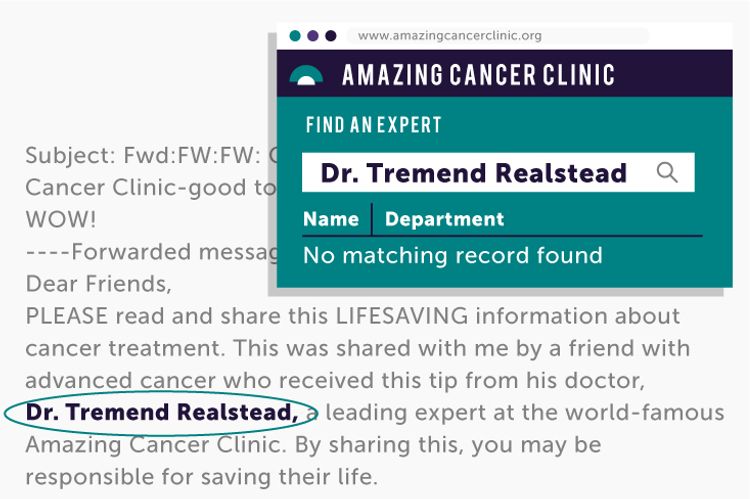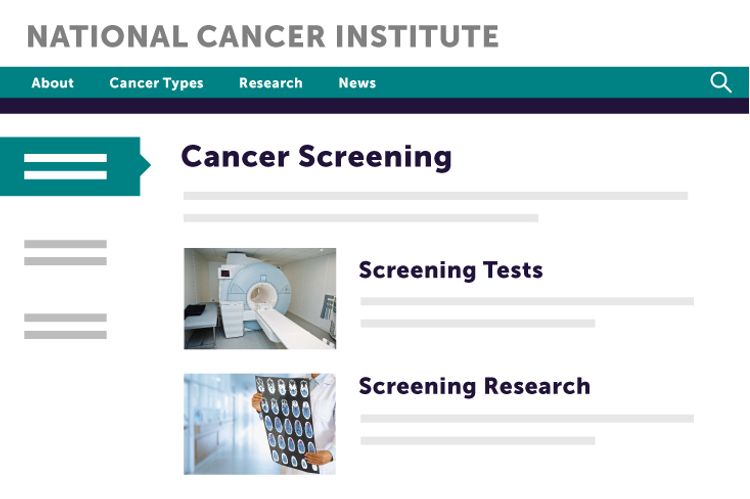URL extension
.gov
United States government agencies
Examples
- National Cancer Institute (cancer.gov)
- Centers for Disease Control and Prevention (CDC.gov)
- National Library of Medicine (pubmed.gov)
Reliability
Very reliable
The internet is full of information about health, but it’s not all reliable or useful. Accurate information may be hard to find and full of hard-to-understand terms. Meanwhile, incorrect or misleading information may spread quickly.

Before you make decisions based on health information you see online (or share that information with someone else), ask yourself some questions about:
The Source
The Content
The Relevance
Before we get started, see if you can answer the following question correctly:
Checking the source of online health information can help you figure out if it is reliable. Test your knowledge by answering the question below about the source of health information. Then read on for some tips on checking the source.
Whether an article about health shows up in your news feed, appears in a search engine result or is sent to you by a friend, it's always a good idea to stop and ask yourself where the information first came from.
If you can find the original article, you can learn a lot about how reliable it is by looking at the type of organization that published it and the website’s URL extension. The URL extension is the 2-4 letters after the dot in the website address (for example, .com or .org).

"Peer-reviewed" is a term used when research results are reviewed by a panel of experts who did not conduct the research to make sure that the findings are credible.
To check the content of an article on cancer, ask yourself what the article is really saying and how the information may relate to your care.
Test your knowledge by answering the question about the two health articles below.
To check the content of health information, ask yourself what the article is about. Is it research, a personal story or something else?

Be aware of exaggerated language. Words like "poison," "scandal" or "shocking" might be red flags that the content isn't balanced or accurate. Content that seems too good to be true or promises to reveal "a secret that your doctor doesn't know" are red flags, too.
Check to see that any experts mentioned in the piece are real experts in the field. Researchers will usually have a page on their hospital's website that shares their training and expertise.
Make sure the article content matches the headline.

Your friend forwards you this email they received from a friend with “important” and “life-saving” information from Dr. Tremend Realstead of the Amazing Cancer Clinic. When you look on the Amazing Cancer Clinic’s website, you learn there is no expert with that name.

Your doctor refers you to the website for the National Cancer Institute. This is a trusted government website which is updated on a regular basis.
To check the relevance of an article on cancer, think about how useful the information is for people in general and how it may relate to your situation or care.
Test your knowledge by answering the question below about the relevance of an article about health, then read on for additional tips.
Reading the full article (rather than just a headline) may help you understand if the information applies to you.

Your Score: 0/4
When you’re reviewing health information online, ask yourself:
Is it trustworthy, or is it a BOAST ?

Our own experiences and opinions affect how we understand information, which gives us biases we might not even recognize. Organizations can be biased, too, sharing information that matches their goals or opinions, even if it isn’t totally factual.

Websites thrive on the number of people who click on or share the article. Articles with sensational headlines get more attention.

When it comes to health information, it’s important to rely on experts, not amateurs.

Websites or social media pages that are trying to sell you something might only present information that supports their product. They may even make up information to make people more interested in what they're selling.

Context is important. Sometimes the media leaves out key details that change how research should be understood.
Sometimes articles cover research without directly saying that it’s too early to be useful. It can take a long time for studies and research to become actionable advice about a person’s health.

Even trusted information based on research might not be relevant for your particular health situation.
Always talk to your healthcare provider before making decisions about your medical care.